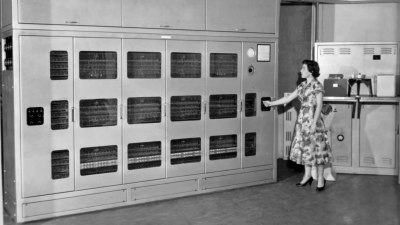When you think about the dawn of modern computers, you often think about the work done in the UK and the US. But Australia had an early computer scene, too, and [State of Electronics] has done a series of videos about the history of computers down under. The latest episode talks about SILLIAC, a computer similar to ILLIAC built for the University of Sydney in the late 1950s.

This episode joins earlier episodes about CSIRAC, and WREDAC. The series starts with the CSIR Mark I, which was the first computer in the southern hemisphere.
The -AC computers have a long history. While you often hear statements like, “…in the old days, a computer like this would fill a room,” SILLIAC, in fact, filled three rooms. The three meters of cabinets were in one room, the power supply in another. The third room? Air conditioning. A lot of tubes (valves, in Australia at the time) generate a lot of heat.
It is hard to put an exact cost on SILLIAC, but the original estimate was about AU£35,200. That sounds modest, but at the time, you could buy about ten suburban homes near Sydney for that price. Like most projects, the cost rose, and completion depended on a larger donation from a horse race. At the end, the cost was about AU£75,000!
SILLIAC had a reputation of being more reliable than some other computers based on the same design. That was probably because most computers use 6J6 tubes, but SILLIAC used 2C51 devices. Bell Labs created the 2C51 for use in undersea cables. Of course, they were also about six times the cost of a 6J6.
The computer did important work until 1968. It was, sadly, dismantled, but pieces of it are hanging around the Powerhouse Museum and at the University as display items.
This series is a great look at what was happening in the computer world south of the equator during these days. While SILLIAC is fascinating, you might want to start with episode 1. Supercomputers have come a long way.
















A lot of articles hailing Australian technology…sounds like southern-Hemisphere propaganda to me! Don’t forget that we Northerners will ALWAYS be on top!
If by a lot you mean…two. As to the other bit, I guess you haven’t seen any maps in Australia huh?
Reminds me of that one guy who refused to say “I understand” in court because to him that meant an admission of subordination.
I have no idea what you are talking about. Care to clarify?
Yes. Sovereign citizens and “Moorish Nationals” believe that the legal system is based on hocus pocus rather than argumentation, and they legitimately believe that if you say you “understand” something, it means that you “stand under” it, and therefore support it.
This is what sovcits actually believe. It would be funny if it weren’t so abjectly pathetic.
On my map, the US is a lot closer to Russia than to the EU.
https://www.europosters.nl/world-map-america-in-center-bathymetry-f127334412
Imagine how much cheaper Chinese goods could be in the US if the US hadn’t been pissing off Russia for the last 75 years and Chinese goods could have been transported over land via Russia to the North American continent. Also imagine how much better it would be for the environment. :)
Even better, ®ussia would have overrun all of Europe too, and after the inevitable famines and deportations, would heave a literally captive market for its second-rate goods there.
Obligatory hackaday reference – yes I have a Soviet 1970’s multimeter.
Imagine how much better life would be for literally everyone if Aleksandr Dugin’s father had had the common courtesy to use a condom, and thus not resulted in this pathetic, decades-long attempt to restore a glory that never existed in the first place. It’s almost like Russia has precisely the same sins as the US does, and nationalists on both sides of the equation suck. Go ask your handlers in the Internet Research Agency for a raise and do better for yourself.
Wait a second…(Ignoring stupid Rusky political derp.)
You think it’s cheaper to transport over land vs ocean?
You live on planet vodka!
Yob Toyo Mat.
Well, yeah. April is Australia Awareness month after all.
What was that? We can’t hear you from up here. Also, why are you guys standing upside down?
Everything is relative :-)
tubes / valves … used in undersea cables ?
Yes, booster amplifiers built into the cables.
Fun fact (that probably came up in these videos) the CSIRAC is probably the only complete and original first generation computer in existence. Having been in service far past when it was obsolete, there was no drive to scrap or repurpose its components so it was just put in storage.
CSIRAC sat on display in the lobby of the accounting faculty of my Uni when I was there in 1980. I saw it daily for those years. At that point, most of the mercury delay lines had been drained of the metal.